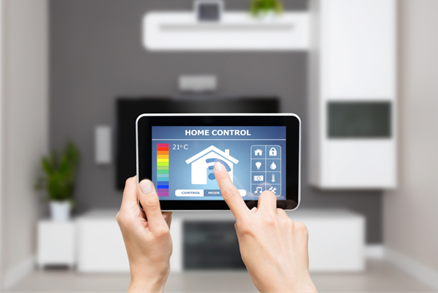| What Homebuyers Should Know About Smart Homes |
| |
 Smart home technology is all the rage, touted as anything from a fun set of individual gadgets to an integrated and connected way to protect your family. But what does it actually mean? And what do you need to know as you shop for a new home? Here are the smart home basics to make your home-buying process easier: Smart home technology is all the rage, touted as anything from a fun set of individual gadgets to an integrated and connected way to protect your family. But what does it actually mean? And what do you need to know as you shop for a new home? Here are the smart home basics to make your home-buying process easier:
Features to Look for
The phrase “smart home” is a catch-all for any residence that uses connected technology to remotely control things like lights, security systems, locks and more. Because the definition of a smart home is so broad, it might refer to a home that only has programmable light bulbs. Moreover, some smart tech home devices easily move with the owner, while some are part of a more permanent installation. Before making an offer on a home with smart features, ask which capabilities are present and which will remain after the sale.
Ongoing Costs and Subscription Fees
If you’re looking at purchasing a smart home, you’ll want to make sure you get all of the details in advance. Some features, such as a monitored home security system, will have ongoing subscription costs. It is important that you factor those fees into your budget before you buy. Ask the seller for an itemized list of any fees associated with the smart home technology.
Passwords, Apps and Access
Since a key component to smart home technology is remote access, you’ll need to be sure access is transferred from the previous owners to you. Setting up a transition plan will save you a lot of headaches down the road.
Ask the sellers for the following:
- A list of all the devices and manuals, if available
- Information about the apps that control each device, especially if manuals are missing.
- The passwords associated with each device
- Information about any programmed “rules” or “scenes” for the devices that are not part of their native apps. A rule might be something like “at dusk, turn on this outlet.” A scene is having a phrase like “good morning” set off a series of events, such as the TV turning on and the pot starting to brew. Sites such as Stringify.com or IFTTT.com allow users to create their own rules or scenes; the current owner should disable these before the sale.
- A physical tour of the device locations and a quick overview of how they work
If any of the devices are associated with a particular email address, make sure the previous owner transfers all ownership to you. Immediately upon purchase of the home, change all passwords and PINs.
Maintenance
The more technology you have in your home, the more chance there is for something to go wrong. If you are tech-savvy, you may be able to handle the troubleshooting yourself or with the help of online or phone technical support. If technology isn’t your strong suit, you’ll want to stick with homes that have more comprehensive systems installed that include repair and support services. Do ask the seller if there are any active service contracts on any of the devices. If you can get the purchase dates for warranty purposes, that may also help you in the future.
Adapted from an article by Christy Matte on RISMedia’s Housecall.
Click on any icon below to share this article:
RISMedia welcomes your questions and comments. Send your e-mail to: realestatemagazinefeedback@rismedia.com.
Copyright© 2024 RISMedia, The Leader in Real Estate Information Systems and Real Estate News. All Rights Reserved. This material may not be republished without permission.
|
|